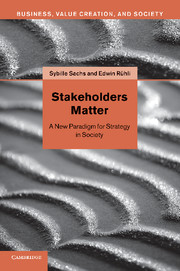Book contents
- Frontmatter
- Contents
- Figures
- Tables
- Foreword
- Acknowledgments
- 1 Challenges for a new paradigm in strategic management
- Part I Development of the basic assumptions of a new stakeholder paradigm
- Part II Our understanding of the stakeholder paradigm and its operationalization
- 5 Our understanding of the stakeholder paradigm operationalized in the three licenses
- 6 License to operate
- 7 License to innovate
- 8 License to compete
- 9 Challenges resulting from a paradigm shift
- Epilogue
- Appendix Methodological considerations
- Glossary
- Notes
- Bibliography
- Index
5 - Our understanding of the stakeholder paradigm operationalized in the three licenses
from Part II - Our understanding of the stakeholder paradigm and its operationalization
Published online by Cambridge University Press: 07 October 2011
- Frontmatter
- Contents
- Figures
- Tables
- Foreword
- Acknowledgments
- 1 Challenges for a new paradigm in strategic management
- Part I Development of the basic assumptions of a new stakeholder paradigm
- Part II Our understanding of the stakeholder paradigm and its operationalization
- 5 Our understanding of the stakeholder paradigm operationalized in the three licenses
- 6 License to operate
- 7 License to innovate
- 8 License to compete
- 9 Challenges resulting from a paradigm shift
- Epilogue
- Appendix Methodological considerations
- Glossary
- Notes
- Bibliography
- Index
Summary
Our claim for the stakeholder paradigm
The economic paradigm in an endless series of constraints
According to traditional economic and strategy theories, the firm is mostly seen as a purely economic institution and its actors as driven by self-interest, with society a constraining factor as we discussed in Chapter 2. A firm’s total economic value creation, by combining and allocating factors of production in the competitive environment, is oriented to a utility function that focuses on one objective, namely value maximization for the owner of capital (e.g. shareholder value).
If all human beings are modeled as self-interested actors and efficient market functioning fails to occur, there must be additional control mechanisms over a firm’s value creation, which is normally in the form of state laws and regulations or in some cases by voluntary self-regulation (e.g. Global Compact). This continuous need for control is even more important as some of the actors are not interested in efficient market functioning.
- Type
- Chapter
- Information
- Stakeholders MatterA New Paradigm for Strategy in Society, pp. 73 - 94Publisher: Cambridge University PressPrint publication year: 2011



